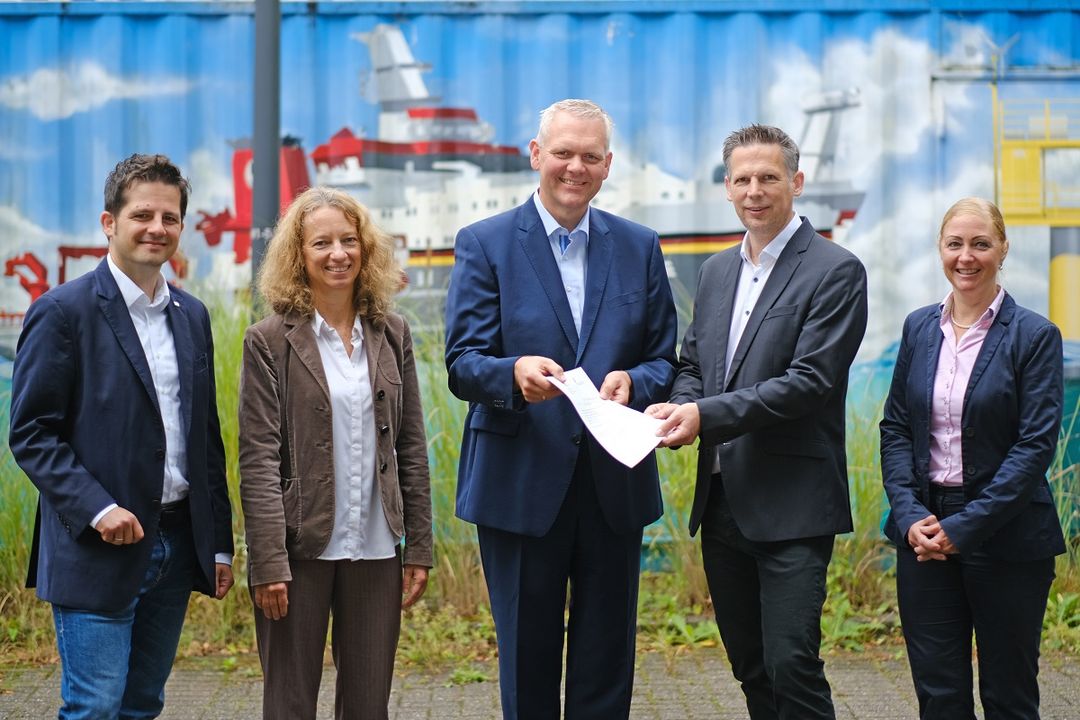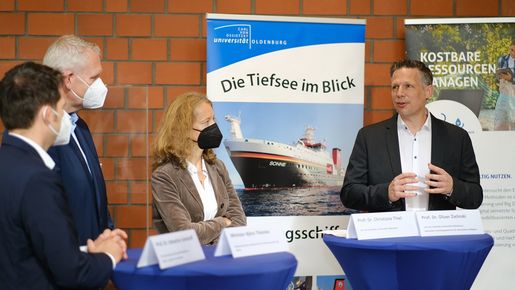Prof. Dr. Oliver Zielinski, Professor of Marine Sensor Systems at the University of Oldenburg, is the spokesperson for the Future Lab Water. At DFKI Niedersachsen, Zielinski, who played a key role in forming the consortium, heads the Marine Perception research department as well as the AI for Environment and Sustainability competence center, DFKI4planet. Zielinski is thus the second head of a research department from DFKI Niedersachsen to assume a spokesperson role. At the Future Lab Agriculture, Professor Dr. Joachim Hertzberg, Managing Director of DFKI Niedersachsen and head of the research department Plan-based Robot Control, holds this position. At the University of Osnabrück, he heads the Knowledge-Based Systems Group.
The new Future Lab Water is one of seven Future Labs of the ZDIN, in which university research, non-university research, industrial research and development as well as the work of practical partners are networked. The common focus is on digitalization in the various areas central to Lower Saxony: agriculture, energy, society & work, health, mobility and production, and now also water.
"We are currently experiencing first-hand how drought and water shortages are presenting us with major challenges due to climate change. At the same time, it was just one year ago that heavy rain and flooding had devastating consequences in the Ahrtal valley, for example", said Lower Saxony's Minister for Science and Culture, Björn Thümler, when handing over the funding decision. "To face these more frequent situations of scarcity and abundance, we need, not least, intelligent water management. This can only be successful with advanced digital tools such as artificial intelligence methods. I am therefore very pleased that the relevant scientific players in Lower Saxony have joined forces in the ZDIN's Future Lab Water. We are happy to support the establishment of this network as an important contribution to tackling major societal challenges."
Opportunities of digitalization for the water sector
Artificial intelligence and data science methods offer opportunities for automated evaluation and linking of data. They enable the identification of unknown correlations and the early detection of sources of danger. Furthermore, a digital twin of reality enables the simulation of processes in order to quantify the impact of potential risks and thus initiate countermeasures in advance. Intelligent visualizations can be used to prepare relevant data and information for decision-makers and citizens, thus achieving greater acceptance and interaction.
The project consortium of the Future Lab Water includes the disciplines of water management, hydraulic engineering, hydrology, coastal engineering, environmental systems science, computer science, sensor technology as well as planning and political sciences. Geographically, the applicant institutions cover the state of Lower Saxony from the coast to the inland up to the Harz low mountain region.
Prof. Dr. Oliver Zielinski, spokesman of the Future Water Laboratory, says: "Water management and the landscape area of water have an elementary supply function for our society. Climate change and the distributed structures of water management call for digitalization in water management in order to ensure the security of supply and quality of the resource water in the future and to significantly improve the handling of extreme situations. This is precisely where the Future Lab Water comes in with its intelligent systems and digital solutions."
Interdisciplinary project consortium
Numerous practical partners have expressed their interest in participating in the Future Lab Water, including representatives from utilities, technology manufacturers, service providers, engineering firms, authorities and associations.
Dr.-Ing. Agnetha Flore, Managing Director of ZDIN: "We are very much looking forward to expanding our network with so many renowned scientists and energetic practice partners. This will allow us to bundle additional know-how in the field of digitization and to further expand cross-cutting topics. The new Future Lab will benefit from the cross-sectoral exchange of ideas between the existing Future Labs, which in turn will receive new impetus from the new colleagues. Together, we will continue to shape Lower Saxony's digital landscape."
About the Future Lab Water:
Funded scientific institutions: Carl von Ossietzky University Oldenburg, German Research Center for Artificial Intelligence (DFKI), Jade University of Applied Sciences Wilhelmshaven | Oldenburg | Elsfleth, Leibniz University Hannover, Leuphana University Lüneburg, Ostfalia University of Applied Sciences, Braunschweig University of Technology, Clausthal University of Technology, University of Osnabrück.
Interested practice partners:
Aerodata AG, AGRAVIS AG, Aller-Ohre-Verband, aqua and waste International GmbH, AquaEcology GmbH & Co. KG, Berky GmbH, BPI Hannover, Bund der Ingenieure für Wasserwirtschaft, Abfallwirtschaft und Kulturbau; Landesverband Niedersachsen und Bremen e.V., BUND für Umwelt und Naturschutz Deutschland e.V., Federal Institute for Geosciences and Natural Resources (BGR), Consulting Engineers Salzgitter GmbH, Dachverband Feldberegnung Lüneburg, Dachverband Feldberegnung Uelzen, DWA Landesverband Nord, EURAWASSER Betriebsführungsgesellschaft mbH, Harzwasserwerke GmbH, Ingenieurgesellschaft für Stadthydrologie mbH, Institut für technisch-wissenschaftliche Hydrologie GmbH, Landesamt für Bergbau, Energie und Geologie; Landkreis Osnabrück, Lower Saxony Chamber of Agriculture, Lower Saxony State Agency for Water Management, Coastal Protection and Nature Conservation; Norddeutsches Wasserzentrum e. V., Okeanos Smart Data Solutions GmbH, Oldenburgisch-Ostfriesischer Wasserverband, SEBA Hydrometrie GmbH &Co. KG, Stadt Hemmingen, Stadt-Land-Fluss Ingenieurdienste, Stadtentwässerung Celle, Stadtentwässerung Hannover, Stadtentwässerung Hildesheim, SWO Netz GmbH, TriOS Mess- und Datentechnik GmbH, Unterhaltungsverband Kehdingen, Vitrum GmbH, Wasser Hannover GmbH, Wasserverbandstag e.V. Bremen, Niedersachsen, Sachsen-Anhalt.


